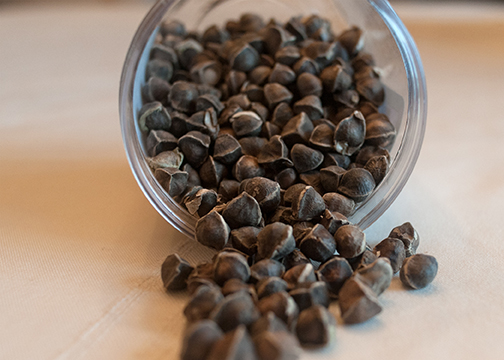

Moringa oleifera (“the drumstick tree seeds”, “Tree of Life”)
Moringa seeds come from the pods (like pea pods) of the moringa (or “drumstick”, “Tree of Life”) tree that is native to India (also grows in China, Africa, and South America.
Habitat/Growing Information.
The Moringa tree is hardy but likes heat and humidity (nothing less than 70 degrees F). In the United States, it should do well in hardiness zones 9-10, and perhaps zone 8 if indoors. They may grow from a cutting or seeds. Moringa can also be potted. They prefer sandy/loamy soil (equal parts soil, sand, clay, and silt)–well draining.
Parts utilized.
The Moringa seeds are commonly used but the bark, leaves, flowers, and fruits may also be used in a variety of products from supplementation to skincare. The seeds come in a “pod” similar to green beans. The seeds/pods may be cooked and eaten. Dehydrated seeds darken in color and resemble a nut. It is possible to extract oil from the seeds to be used in food or other topical applications (e.g. skincare). Its oil is known as “Ben oil” or “Behen oil” and somewhat resembles olive oil (Leone et al., 2016). Oil is 36.7% of the seed’s weight (Leone et al., 2016). The leaves may be cooked and eaten (like spinach) or enjoyed raw as part of a salad. The leaves may be dehydrated and used more like a tea. The leaves may also be dried and ground up into a powder to use as various condiments/ingredients.
Properties.
Moringa seeds are high in vitamins A, B1 (thiamin), B2 (riboflavin), B3 (niacin), and B6. They are also good sources of phytochemicals, folate/ascorbic acid, calcium, potassium, iron, magnesium, phosphorus, and zinc. Moringa leaves are rich sources of protein, minerals, B-carotene, and antioxidants (Leone et al., 2016; Kou, Li, Olayanju, Drake, & Chen, 2018).
Moringa seeds have long been used in Asia for a variety of remedies due to their medicinal properties: regulate blood sugar; antioxidant; stomach pain; anti-bacterial/anti-fungal; digestive aid; water purification; attenuate inflammatory response; hepatoprotective; neuroprotective (Leone et al., 2016; Kou et al., 2018).
Further research on the Moringa tree products and properties should be very interesting.
References
- https://www.medicalnewstoday.com/articles/319916.php#what-is-in-moringa
- https://food.ndtv.com/health/10-incredible-health-benefits-of-moringa-seeds-1645730
- https://www.webmd.com/vitamins/ai/ingredientmono-1242/moringa
- https://moringafarms.com/growing-moringa/
- https://www.bobvila.com/articles/loamy-soil/
- Leone, A., Spada, A., Battezzati, A., Schiraldi, A., Aristil, J., & Bertoli, S. (2016). Moringa oleifera seeds and oil: Characteristics and uses for human health. International journal of molecular sciences, 17(12), 2141.
- Kou, X., Li, B., Olayanju, J., Drake, J., & Chen, N. (2018). Nutraceutical or Pharmacological Potential of Moringa oleifera Lam. Nutrients, 10(3), 343.
